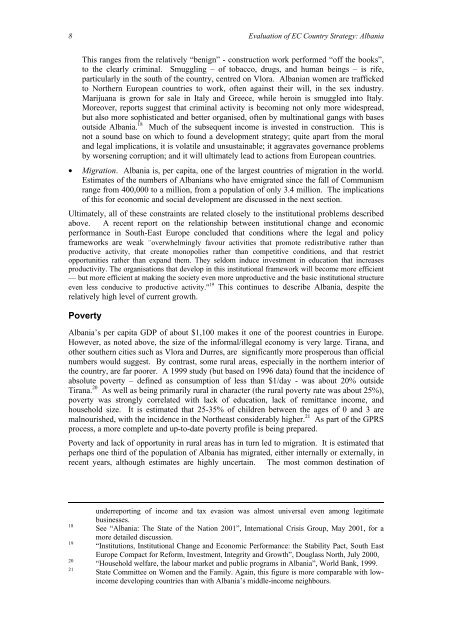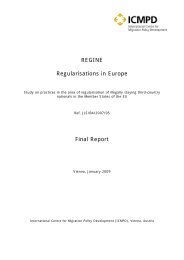Final Report - European Commission - Europa
Final Report - European Commission - Europa
Final Report - European Commission - Europa
You also want an ePaper? Increase the reach of your titles
YUMPU automatically turns print PDFs into web optimized ePapers that Google loves.
8<br />
Evaluation of EC Country Strategy: Albania<br />
This ranges from the relatively “benign” - construction work performed “off the books”,<br />
to the clearly criminal. Smuggling – of tobacco, drugs, and human beings – is rife,<br />
particularly in the south of the country, centred on Vlora. Albanian women are trafficked<br />
to Northern <strong>European</strong> countries to work, often against their will, in the sex industry.<br />
Marijuana is grown for sale in Italy and Greece, while heroin is smuggled into Italy.<br />
Moreover, reports suggest that criminal activity is becoming not only more widespread,<br />
but also more sophisticated and better organised, often by multinational gangs with bases<br />
outside Albania. 18 Much of the subsequent income is invested in construction. This is<br />
not a sound base on which to found a development strategy; quite apart from the moral<br />
and legal implications, it is volatile and unsustainable; it aggravates governance problems<br />
by worsening corruption; and it will ultimately lead to actions from <strong>European</strong> countries.<br />
• Migration. Albania is, per capita, one of the largest countries of migration in the world.<br />
Estimates of the numbers of Albanians who have emigrated since the fall of Communism<br />
range from 400,000 to a million, from a population of only 3.4 million. The implications<br />
of this for economic and social development are discussed in the next section.<br />
Ultimately, all of these constraints are related closely to the institutional problems described<br />
above. A recent report on the relationship between institutional change and economic<br />
performance in South-East Europe concluded that conditions where the legal and policy<br />
frameworks are weak "overwhelmingly favour activities that promote redistributive rather than<br />
productive activity, that create monopolies rather than competitive conditions, and that restrict<br />
opportunities rather than expand them. They seldom induce investment in education that increases<br />
productivity. The organisations that develop in this institutional framework will become more efficient<br />
— but more efficient at making the society even more unproductive and the basic institutional structure<br />
even less conducive to productive activity." 19 This continues to describe Albania, despite the<br />
relatively high level of current growth.<br />
Poverty<br />
Albania’s per capita GDP of about $1,100 makes it one of the poorest countries in Europe.<br />
However, as noted above, the size of the informal/illegal economy is very large. Tirana, and<br />
other southern cities such as Vlora and Durres, are significantly more prosperous than official<br />
numbers would suggest. By contrast, some rural areas, especially in the northern interior of<br />
the country, are far poorer. A 1999 study (but based on 1996 data) found that the incidence of<br />
absolute poverty – defined as consumption of less than $1/day - was about 20% outside<br />
Tirana. 20 As well as being primarily rural in character (the rural poverty rate was about 25%),<br />
poverty was strongly correlated with lack of education, lack of remittance income, and<br />
household size. It is estimated that 25-35% of children between the ages of 0 and 3 are<br />
malnourished, with the incidence in the Northeast considerably higher. 21 As part of the GPRS<br />
process, a more complete and up-to-date poverty profile is being prepared.<br />
Poverty and lack of opportunity in rural areas has in turn led to migration. It is estimated that<br />
perhaps one third of the population of Albania has migrated, either internally or externally, in<br />
recent years, although estimates are highly uncertain. The most common destination of<br />
18<br />
19<br />
20<br />
21<br />
underreporting of income and tax evasion was almost universal even among legitimate<br />
businesses.<br />
See “Albania: The State of the Nation 2001”, International Crisis Group, May 2001, for a<br />
more detailed discussion.<br />
“Institutions, Institutional Change and Economic Performance: the Stability Pact, South East<br />
Europe Compact for Reform, Investment, Integrity and Growth”, Douglass North, July 2000,<br />
“Household welfare, the labour market and public programs in Albania”, World Bank, 1999.<br />
State Committee on Women and the Family. Again, this figure is more comparable with lowincome<br />
developing countries than with Albania’s middle-income neighbours.
















